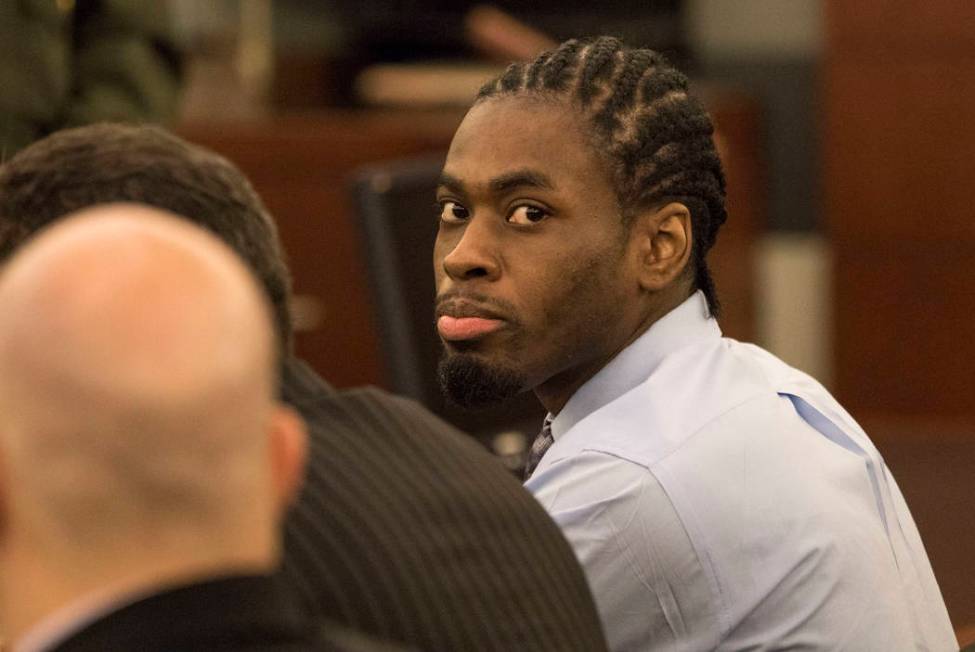Man guilty of killing Las Vegas mom, daughter back in court

His hands cuffed in front of him, Bryan Clay sat in a navy-blue jumpsuit Thursday as he listened to prosecutor Pamela Weckerly detail his jailhouse phone calls.
“He said that he tricked jurors, that he’ll be back soon, that he’ll, in fact, get his appeal more quickly,” she told District Judge Douglas Herndon.
Last month, a jury of all women declined to impose capital punishment in the double murder case and instead sentenced Clay to life in prison without the possibility of parole.
Clay, 27, appeared before Herndon on Thursday for his formal sentencing in the murders of Ignacia “Yadira” Martinez, 38, and her 10-year-old daughter, Karla. The judge also sentenced him for related crimes: attempted murder, robbery, kidnapping and sexual assault of a minor under 14.
The defendant was convicted in November of fatally beating the mother and daughter in an April 2012 attack that also nearly killed the woman’s husband, Arturo Martinez.
Wecklery told the judge that in recorded jail calls, Clay made veiled threats to other victims in the case and a witness who connected him to a stolen phone from a nearby assault that occurred within hours of the killing.
“Not withstanding his tearful allocution, Mr. Clay clearly does not accept any responsibility for what he did, and even more scary, he does not understand the nature of what he did,” she said. “Please, sentence the real Mr. Clay. We know who he really is.”
After the murders, Clay told police that he was under the influence of drugs and alcohol and had no recollection of the killings.
In a Dec. 4 statement to jurors, Clay expressed gratitude to the victims’ relatives, who have publicly forgiven him, and said he understands that they want justice.
“I try to accept the forgiveness from this family, but I don’t feel like they should forgive me,” he said.
On Thursday, he addressed the judge.
“I’ve got a big mouth,” Clay said about the recorded phone calls. “I built those walls, and I have a right to protect myself with those walls. It might be rugged, it might be rough, but look where I come from, I come from nothing.”
He told the judge that everybody’s walls are built differently, that he couldn’t fake the emotions in his statement to jurors, and that he was trying to protect his family by giving them false hope.
“What am I supposed to do? Say, ‘Oh yeah, I’m broken, family. Let’s cry together,’” he said. “Or ‘I’m gonna keep my head up, I’m gonna keep fighting.’”
He finished his four-minute speech by alluding to an appeal, saying, “We’re not done yet. It’s not complete.”
Herndon perched his glasses on his head, leaned back in his chair and told Clay the phone calls show a lack of remorse and understanding of the brutal crimes.
“This case has haunted me since opening statements,” he said. “The worst things that a human being can do to another human being, and you just learned how to kind of deal with and live with it.”
If anything were to be classified as “unspeakable,” it would be the details of this case, Herndon said.
He told Clay that nobody capable of such crimes deserves to be in society.
“At some point in the quiet of your cell in the Nevada prison where you will live until you die, you’re going to have to face responsibility and accountability yourself,” the judge said.
“Maybe you psychologically pushed it further back because you can’t live with the horror of what you did, but I think you know more.”
Contact Briana Erickson at berickson@reviewjournal.com or 702-387-5244. Follow @brianarerick on Twitter.